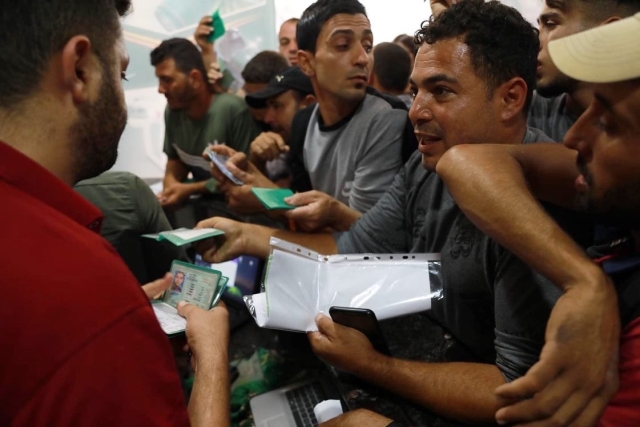There is a commonality that is evident between some of the terrorists who have attacked Israelis in recent months and years, it is the same thing that is used often to dispel the notion Israel is an apartheid, xenophobic state, and that is their Israeli work permits.
The terrorist who carried out the most recent attack on Israeli civilians near the industrial area of Ariel, Muhammad Morad Souf from the village of Hares, had a legal work permit that allowed him to work at an Israeli cleaning supplies factory.
Last September, the terrorist Musa Sarsour, a resident of the Nablus area with a work permit in Israel, murdered an 84-year-old resident of Holon, Shulamit Ovadia, and then committed suicide.
Palestinian worker Kamel Hashim tells #Israel Kan11 that he opposes Palestinian attacks on Israelis, saying they interfere with Palestinians' lives and interests, decrease number of work permits, increase time needed to cross checkpoints, cause fear and war. pic.twitter.com/hnAghcw5xy
— Hussain Abdul-Hussain (@hahussain) November 15, 2022
In another case, Ismail Nimer, a terrorist who carried out the stabbing attack in the Ramot neighborhood of Jerusalem, in which a resident of the city was injured, carried with him a special work permit that is issued for business purposes and allows him to fly abroad through the National Airport.
There are about 70,000 work permit holders that are residents of Palestinian Authority-administered areas, most of them construction workers. Often after terrorist attacks, Israel suspends the work permits of those who are associated with the area from which the terrorist came, which is a necessary step to determine if anyone among the attacker's peer group knew about the attack in advance. In addition to legal Palestinian workers, the Israel Defense Forces estimate that thousands sneak or are smuggled in daily. These illegal workers are called “shabahim”, a Hebrew abbreviation for “illegal indwellers”.
The lack of accountability on the Palestinian Authority is ridiculous. Work permits are cherished by PA citizens & most are happy to come into Israel to work. PA has no economic plan for their citizens, minimal health care, etc. & gazillions in foreign aid.
— Irene Rabinowitz 🇮🇱 (@irenerabinowitz) November 16, 2022
The former Israeli government, even the current one, has been hesitant on changing the status quo for Palestinian workers. The general consensus has been that poverty is a strong seed for terrorism and steady, decent-paying, work would help combat it. The money given to the PA to help build out industry as well as the investments made by many Arab nations like the United Arab Emirates and Saudi Arabia often disappears and the project fades. As a result of this fact, it falls on Israel to provide opportunities for Palestinians.
You need to suspend all Palestinian work permits. And you need a curfew in problem cities.
— Levantine Indigenous (@LevantNative) October 30, 2022
Despite this sober reality that it is on Israel to create jobs for Palestinians, many Israelis who voted in the soon-to-be government, have hopes that the current policy will change and allow for further regulation and security measures. While most of the nation according to a recent poll want a centrist government, an overwhelming portion of the population, including the Israeli-Arab population wants a more secure border and tighter restrictions on the entrance of Palestinians into Israel.
One of the driving factors of this sentiment has been the incentives given to the assailants, which go to their families if they are killed. Some of the attacks on Israelis have been done out of financial need. Some are in debt to the Palestinian underworld and are under pressure, while others are being pressured by friends or family associated with a terror group and the well-being of their families is threatened unless they commit an attack. The Palestinian Authority's "pay-to-slay" program is a guaranteed payout and it has been a factor in some of the attacks.
Not a single tax dollar should go to fund Palestinian terrorism through its abhorrent "pay to slay" program.https://t.co/RMZtTU1Dvy
— Mike Pompeo (@mikepompeo) November 15, 2022
The head of the Shomron Regional Council, Yossi Dagan, reacted to the recent stabbing attack in the Ariel industrial area, saying that it is "a clear result of the loss of governance and the loss of deterrence of the outgoing government, the incoming government must conduct itself as a national government and must reverse the equation. Whoever is behind this wave of terrorism and is financing it is the terrorist in the suit, Abu Mazen. The Israeli government must make him a security target. The one behind this wave of terror is the Palestinian Authority, not all kinds of local poisons."


